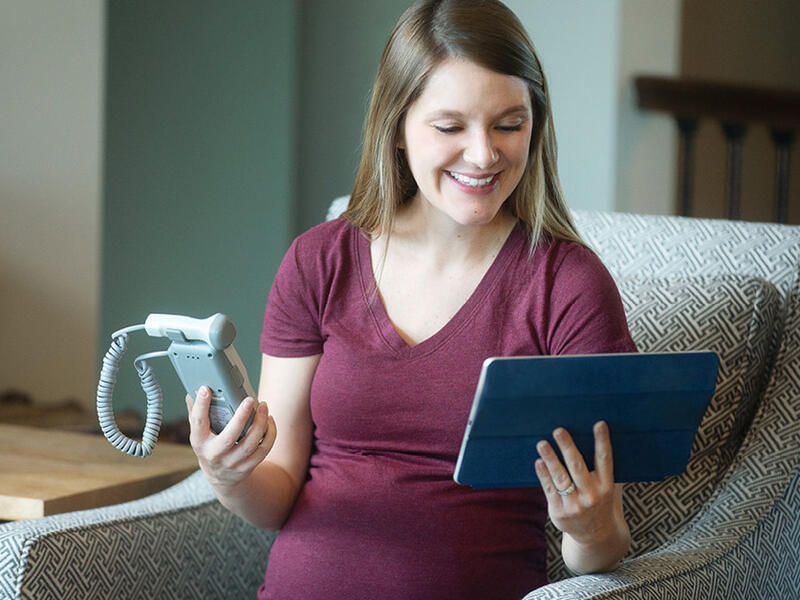Giving birth comes with challenges under any conditions. But what about a pandemic pregnancy? What can you do when COVID-19 still has a presence where you live?
The potential for added stress and anxiety is there. However, conversations with your primary provider can help alleviate your concerns.
Bottom line: It’s safe to have a baby during the pandemic, though the guidelines that ensure that safety may make it a different experience than it would have been prior to onset of COVID-19.
“A lot of the questions we get are about the precautions to take because of the pandemic,” said Dr. Megan Miller, an OB/GYN at Sanford Medical Center in Bismarck, North Dakota. “They want to know about how long they have to keep their family away after they take their newborn home. We definitely have a lot of conversations about current guidelines for quarantine and social distancing.”
Pregnancies may be at increased risk
It is especially important during pregnancy to follow recommendations regarding protecting yourself from getting COVID-19. At this time, the CDC warns that during pregnancy women are at an increased risk for severe illness from COVID-19 and death, compared to those who are not pregnant. Additionally, the CDC reports that pregnant women with COVID-19 may be at increased risk for other adverse outcomes, such as preterm birth.
The first step, then, is to take the protective measures we should all be taking:
- Practice social distancing
- Wear a mask
- Wash hands
- Avoid activities that would make those steps difficult.
The biggest change for most pregnancies is that hospitals and clinics limit the number of people coming in and out. It can mean expectant mothers have less company for their doctor visits than would customarily be the case.
That includes milestone visits like ultrasounds, for instance, or that first doctor’s appointment or those first opportunities to see the new baby.
Because visitation policy can vary slightly among Sanford Health locations, patients should be familiar with local guidelines when arranging an appointment.
Time for baby bonding
“For parents that can be really hard because they have to decide who can come to the hospital and see the new baby,” Dr. Miller said. “Maybe they have multiple kids at home. Which one can see the new baby? For a lot of people that’s the hardest thing to deal with.”
Limited exposures within the clinic help keep staff, physicians and their patients safe. On a more personal level, Dr. Miller tells new parents, in essence, to concentrate on enjoying those first days with their new son or daughter.
“Think of it as bonding time between you and the baby,” Dr. Miller said. “You don’t have to worry about having all these people coming into the hospital and wanting to hold the baby. You can spend more time getting to know your baby and more time with all those little things that might not be a focus if you have a bunch of people coming through.”
Vaccines safe for pregnant women
Getting vaccinated for COVID-19 is safe for pregnant women, Sanford Health chief physician Dr. Jeremy Cauwels said during a Facebook Live session that aired on Jan. 5. It is also safe for those planning to expand their families. Pregnant women wondering about a COVID-19 vaccine should have a conversation with their doctor about its safety.
“Universally, our obstetricians have decided they would encourage this vaccine in pregnancy and would be willing to have a conversation with any woman who is pregnant, hoping to become pregnant or is making plans for baby in the future, to talk through why this vaccine is a wise idea,” Dr. Cauwels said.
Reminders that hospitals and clinics are safe will continue to be an important part of conversations moving forward, Dr. Miller said. That goes for health care appointments preceding birth and for delivery itself.
“We hear about people talking about home delivery because there is the risk of exposure,” Dr. Miller said. “So we emphasize the hospital is a safe place and we do everything we can to keep it safe. Your risk of COVID exposure in a hospital is minimal. We’re trying to give you what’s best for your baby and best for our staff.”
Information in this story was accurate when it was posted. As the COVID-19 pandemic changes, scientific understanding and guidelines may have changed since the original publication date.
Learn more
- Vaccine FAQs: Do COVID-19 vaccines affect pregnancy?
- Introducing ‘Her Kind of Healthy’ podcast: OB video visits
- Mom describes experience of having baby during pandemic
…
Posted In Bismarck, COVID-19, Family Medicine, Immunizations, Pregnancy, Sioux Falls, Women's
